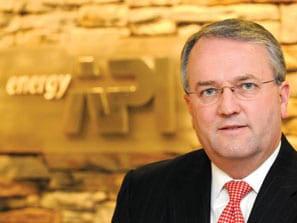Oil industry lobbyist and president of the American Petroleum Institute (API) Jack Gerard made his industry’s goal clear in a recent interview with Fortune Magazine. Mr. Gerard said he hopes that in the near future there will be an oil lobbyist on the ground in every U.S. Congressional district in order to help his industry flourish, “so when a policy proposal hits the industry’s bottom line, lawmakers from Seattle to Savannah will hear complaints about it from voters back home.”
As API president, Mr. Gerard is the leading representative for more than 400 different oil and gas companies. Gerard took the helm of API in November 2008, leaving a lucrative post as the head of the American Chemistry Council. In the short time that Gerard has led the API, he has instituted numerous reforms to help the oil industry focus its messaging to change public attitudes towards the industry’s behavior.
One of the major tools that Gerard brings to the API is the use of astroturf “grassroots” operations, something that the oil industry had not yet capitalized on.
In a series of town hall events last summer, Gerard used his astroturf activists to help spread misinformation about a Democratic-sponsored bill in Congress that would have placed stricter standards on offshore oil rigs in order to prevent disasters like the BP Deepwater Horizon. The bill would have also removed liability caps for companies who spill oil, something the oil industry was vehemently opposed to.
Thanks to Gerard’s astroturf efforts, public opposition to the bill appeared to originate from the bottom up, and the bill was defeated in Congress. Fortune described one of Gerard’s less-than-honest tactics during that process:
“Last summer, after the House passed a tough bill to boost safety standards for offshore drilling and remove a liability cap for oil spills, Gerard mounted a round of rallies in regions far from the oilfields. At one, in suburban Chicago, more than 500 union workers assembled for a slick corporate production stage-managed to look like a working-class event.”
Gerard has also helped streamline his organization, laying off 20% of the API staff, and whittling dozens of priorities down to about six.
One of the most significant areas that he cut is the API’s modest research into renewable energy sources. His main focus has been to recruit Democrats to the side of big oil, in order change the perception that only Republicans support the fossil fuel energy industry. Again, from Fortune:
“He has set about trying to change the perception that Big Oil and Republican politics are inextricably bound, a pursuit that gained urgency when Obama moved into the White House. Gerard acted quickly, hiring Marty Durbin, nephew of the No. 2 Senate Democrat, Dick Durbin of Illinois, to head up API’s lobbying team and start opening Democratic doors on the Hill. He organized fly-in lobbying visits by African-American, Hispanic, and female oil workers. And he formed a partnership with the building and construction trades department of the AFL–CIO to tout the job-creating potential of new drilling projects. Informal talks with social-media experts from the Obama campaign prompted Gerard to poach Nature Conservancy’s Deryck Spooner to help build a grass-roots army that now claims more than 500,000 members.”
Gerard’s efforts appear to have paid off, as his industry was able to keep their multi-billion dollar subsidies and tax breaks in the midst of a nasty budget fight in Washington. And with the success of last summer’s astroturf campaign to defeat oil drilling safety measures, Gerard has announced that he is planning to do the same thing in the next few months to combat the negative attention that currently surrounds the practice of hydraulic fracturing.
With plenty of oil and gas money backing him, Jack Gerard seems unstoppable. And thanks to Citizens United, he might very well be unstoppable. According to independent analysis, candidates who receive and spend the most money during a campaign win their election in more than 90% of races – from local to federal offices.
If Mr. Gerard is successful in placing lobbyists and oil representatives in every district in America, Big Oil could truly determine the outcome of nearly every political race from now on.
Subscribe to our newsletter
Stay up to date with DeSmog news and alerts






